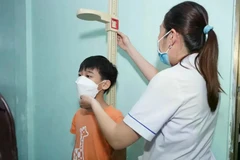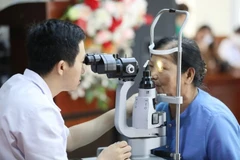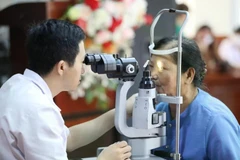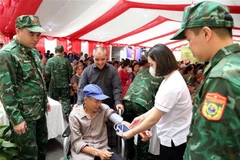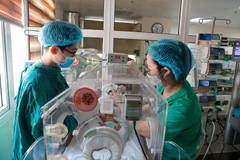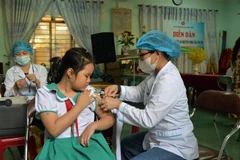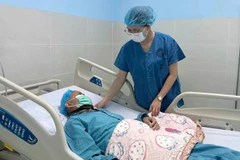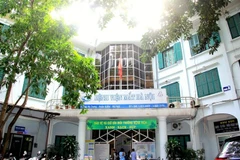Hanoi (VNA) – Over the years, grassroots healthcare has obtained many achievements in caring for people’s health. However, it is necessary for local health stations to renovate to meet the requirements of the new context, a senior official has said.
Associate Prof. Phan Le Thu Hang, Deputy Director of the Ministry of Health’s Department of Planning and Finance, made the remarks at a conference held in Hanoi on March 27 to discuss the orientations for developing grassroots healthcare in the new context.
 Phan Le Thu Hang, Deputy Director of the MoH’s Department of Planning and Finance. (Photo: VietnamPlus)
Phan Le Thu Hang, Deputy Director of the MoH’s Department of Planning and Finance. (Photo: VietnamPlus)
Addressing the event, Deputy Minister of Health Do Xuan Tuyen said the Party, National Assembly, and Government have issued many policies to improve grassroots healthcare, including Directive 06-CT/TW on consolidating grassroots healthcare, issued by the 9th Party Central Committee’s Secretariat on January 22, 2002.
The Party Central Committee’s Secretariat has assigned the Ministry of Health’s Party Civil Affairs Committee to draft a directive on developing grassroots healthcare in the new context. The draft should be submitted to the Secretariat in May, he noted.
After 20 years of implementing Directive 06-CT/TW, Party committees and administrations from the central to grassroots levels have shown considerable improvements in the awareness of the importance of grassroots healthcare. Communities consider the consolidation of grassroots healthcare as a crucial task in socio-economic development plans.
As a result, basic health indexes of Vietnamese people have improved remarkably after 20 years. For example, the average life expectancy increased from 71.3 in 2002 to 73.6 in 2022, higher than the global average of 73 and many countries with similar per capita income level. The coverage of essential health services reached 70 out of 100 points in 2020, higher than the average of 61 in Southeast Asia and 67 in the world. Vietnam has also gained respect from the international community for its realisation of the Millennium Development Goals.
Those achievements were largely contributed by the grassroots healthcare network, participants opined.
However, there remain certain shortcomings, they pointed out, elaborating that grassroots health services are focused on treatment while disease prevention, management, and early detection do not receive due attention. The system is also facing numerous challenges such as rapid population aging, an increase in non-communicable diseases, and unpredictable developments of new epidemics.
They agreed on measures mentioned in the draft directive, including enhancing Party committees and administrations’ sense of responsibility, upgrading infrastructure, reforming commune-level medical facilities and financial mechanism, increasing manpower for grassroots healthcare, and stepping up health education.
 Christophe Lemiere, Programme Leader Human Development at the World Bank, speaks at the event. (Photo: Vietnam Plus)
Christophe Lemiere, Programme Leader Human Development at the World Bank, speaks at the event. (Photo: Vietnam Plus)
Christophe Lemiere, Programme Leader Human Development at the World Bank (WB) said that in recent years Vietnam has recorded progress in the development of the grassroots health system as the country’s universal health coverage index is at a high level.
However, he underlined the need to strengthen Vietnam's grassroots health system.
Statistics from the Ministry of Health showed that 45% of health expenditure is spent on inpatient care, while this proportion in other developing countries is only about 30%, Lemiere said.
Another study revealed that about 30% of inpatient treatment could be avoided and treated at the grassroots healthcare facilities, he went on.
The World Bank expert said it is essential for Vietnam to invest more in the grassroots health system and set forth a new policy to ensure funding for the operation of this system, adding that the World Bank can offer maximum support for the Southeast Asian country in this regard./.








